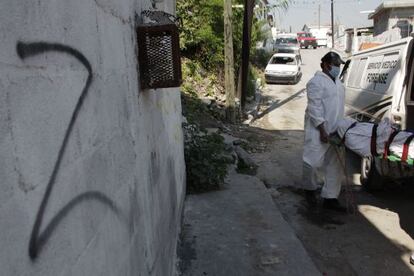Internal Zetas war poses new security challenge for Mexico’s PRI
Peña Nieto will have to deal with fallout from cartel's bloody leadership struggle

Mexico's bloodiest drug cartel, the Zetas, which has been expanding its power over the past three years, is apparently embroiled in a gory internal war among its own members, who are being gunned down and brutally executed. What had been a rumor for months was confirmed several days ago by the country's federal prosecutor.
Since the beginning of the summer, the Zetas' two capos, Heriberto Lazcano Lazcano, alias "El Lazca," and Miguel Ángel Treviño Morales, known as "Z-40," have taken up arms against each other for leadership, money and territory in the states where, for the moment, the drug war rages: Michoacán, San Luis Potosí, Zacatecas, Nuevo León, Tamaulipas and Coahuila, all in the north of the country.
The cartel's bitter split has led to a new spiral of bloody violence that could completely change the government's strategies in the drug war in Mexico -- which has claimed approximately 55,000 lives since 2006 -- months before President-elect Enrique Peña Nieto and his Revolutionary Institutional Party (PRI) are set to take office.
According to an investigation by the weekly magazine Proceso,the first clues about the split in the Zetas' leadership surfaced in June when several mid-ranking leaders were captured by the federal police without firing a single shot. Then came the appearance of signs posted in the historic city centers of Zacatecas, Monterrey and Ciudad Mante warning of infiltrators inside the cartel, and a YouTube video accusing Z-40 of being the "Judas of the Zetas."
The Zetas have rapidly extended their operations across the country; they are present in at least 16 of 32 states
More evidence of the rupture came on August 9 when 14 hitmen were massacred outside San Luis Potosí. Iván Velázquez, known as the "The Taliban," decided to rub out his rivals -- men loyal to Treviño who came from the neighboring state of Coahuila. A survivor of the massacre told the military where The Taliban was hiding and a two-hour shootout near a university unfolded, leaving students badly shaken up. Soldiers killed three members of the band and arrested four others, but Velázquez managed to escape.
Within 48 hours of that confrontation, about 40 murders took place in San Luis Potosí and Zacatecas, and 33 more in Monterrey. On one victim's body executors left a note that read: "This is what happens to all traitors." According to the Mexican press, some 1,400 of the murders that took place in August -- one of the bloodiest months in the drug war since President Felipe Calderón took office in 2006 -- were related to the Zetas' internal battles.
The Zetas were formed by 14 members of the Army's Special Forces Group (GAFE), who were bribed and hired by then-Gulf Cartel chief Osiel Cárdenas Guillén in 1998 to become hitmen for his organization. Cárdenas, who was captured in 2003 and extradited in 2007, is now serving time in the United States.
After Cárdenas' capture, Lazcano formed his own drug cartel, which would become synonymous with cruelty and horror. Its modus operandi is to decapitate victims, and leave their bodies or heads in public places. The Zetas are blamed for the August 2010 massacre of 72 migrants in Tamaulipas.
The Zetas split is like the mutation of the AIDS virus; we are going to need to find two cures"
Lazcano, 38, is a former army corporal, who comes from a poor family in Hidalgo state, while Z-40 is a 42-year-old former auto thief from Tamaulipas.
The Zetas have rapidly extended their operations across the country -- they are present in at least 16 of Mexico's 32 states -- setting up criminal franchises, recruiting local hoodlums and becoming more involved in migrant trafficking, extortion and kidnappings.
"They are a decentralized organization, with self-financing cells, which probably after a certain size are difficult to control from the top level," says investigator Alejandro Hope, who adds that it will be very hard for local authorities to crack down on so many groups within their jurisdictions.
Another potentially explosive scenario would be an all-out war for the drug trade and routes controlled by the Gulf Cartel, which has suffered a series of blows over past weeks, with the arrests earlier this month of leader Jorge Eduardo Costilla Sánchez, known as "El Coss," and Mario Cárdenas Guillén, the brother of former cartel head Osiel Cárdenas Guillén.
The situation poses a serious security challenge for Peña Nieto, who takes office in December.
As British journalist Ioan Grillo, author of the El Narco: Inside Mexico's Criminal Insurgency, said he was told by a lieutenant colonel in San Luis Potosí, the split inside the Zetas is like "the mutation of the AIDS virus; we are going to need to find two cures."
Tu suscripción se está usando en otro dispositivo
¿Quieres añadir otro usuario a tu suscripción?
Si continúas leyendo en este dispositivo, no se podrá leer en el otro.
FlechaTu suscripción se está usando en otro dispositivo y solo puedes acceder a EL PAÍS desde un dispositivo a la vez.
Si quieres compartir tu cuenta, cambia tu suscripción a la modalidad Premium, así podrás añadir otro usuario. Cada uno accederá con su propia cuenta de email, lo que os permitirá personalizar vuestra experiencia en EL PAÍS.
¿Tienes una suscripción de empresa? Accede aquí para contratar más cuentas.
En el caso de no saber quién está usando tu cuenta, te recomendamos cambiar tu contraseña aquí.
Si decides continuar compartiendo tu cuenta, este mensaje se mostrará en tu dispositivo y en el de la otra persona que está usando tu cuenta de forma indefinida, afectando a tu experiencia de lectura. Puedes consultar aquí los términos y condiciones de la suscripción digital.








































